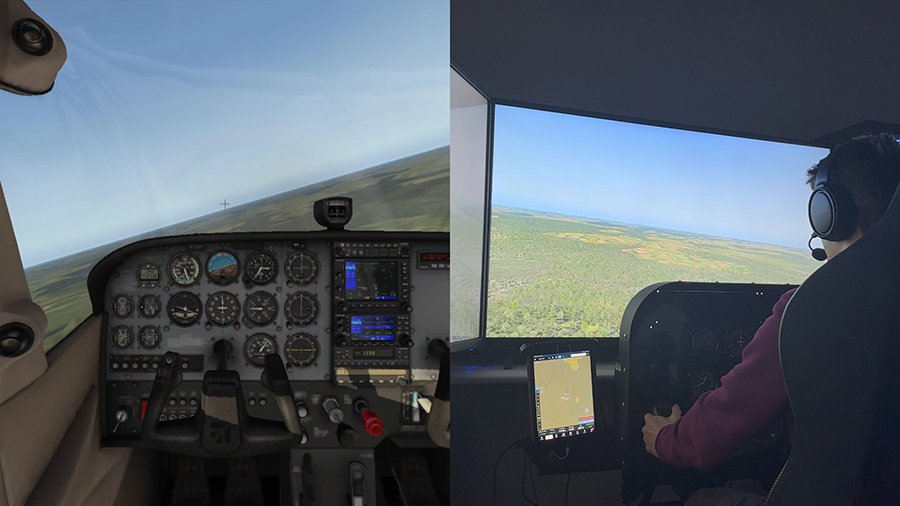<<Easiest & Proven Way to Make $100 Daily with 0 COST – Watch THIS FREE Training to START >>
Case Studies Of Ai In Cargo Operations
Several case studies demonstrate the efficacy of AI in cargo operations. One notable example is the use of AI algorithms to predict maintenance needs, thereby preventing costly downtimes and ensuring the seamless operation of cargo fleets. Additionally, AI facilitates real-time monitoring of cargo conditions, leading to improved safety and security measures.
The Environmental Impact Of Ai Flights
In today’s world, where environmental sustainability is a pressing concern, the aviation industry has been striving to reduce its carbon footprint. Artificial Intelligence (AI) has emerged as a game-changer in this regard, revolutionizing the way flights are operated. With AI pilots, airlines are not only improving fuel efficiency and routing but also significantly reducing the environmental impact of their flights.
Fuel Efficiency And Ai Routing
One of the key advantages of AI pilots is their ability to optimize fuel consumption and enhance overall efficiency. By analyzing vast amounts of data in real-time, AI systems can make precise calculations and adjustments, leading to more economical flights. These systems consider various factors such as weather conditions, air traffic, and aircraft performance, enabling them to optimize fuel usage and reduce emissions.
Reducing Carbon Footprint With Ai
AI pilots play a crucial role in minimizing the carbon footprint of flights. Through advanced algorithms and machine learning, these systems continuously learn and adapt, making them capable of making environmentally conscious decisions. By analyzing historical flight data and considering various variables, AI pilots can suggest alternative flight routes that are more fuel-efficient and emit fewer greenhouse gases. This not only benefits the environment but also helps airlines save on fuel costs.
Moreover, AI pilots can assist in reducing taxi time on the ground. By analyzing airport traffic patterns and collaborating with ground control, these systems can optimize the flow of aircraft, minimizing the time planes spend idling on the tarmac. This results in reduced fuel consumption and emissions during ground operations.
In conclusion, AI pilots have a significant impact on the environmental sustainability of flights. Through fuel efficiency optimization and intelligent routing, these systems contribute to the reduction of carbon emissions in the aviation industry. By embracing AI technology, airlines are taking a step towards a greener future, where air travel is both efficient and environmentally responsible.

Credit: aerospaceamerica.aiaa.org
Preparing The Next Generation Of Pilots
As we prepare the next generation of pilots, it’s crucial to harness the power of AI in training and education. AI technology can enhance learning experiences, improve safety protocols, and provide invaluable insights into pilot performance.
Ensuring that future aviators are equipped with the evolving skillset is vital. With the integration of AI, pilots will need to possess a broader understanding of technology, data analysis, and decision-making in complex environments.
<<Easiest & Proven Way to Make $100 Daily with 0 COST – Watch THIS FREE Training to START >>
The Role Of Big Data In Ai Aviation
The aviation industry is constantly evolving, and with the emergence of Artificial Intelligence (AI), it is set to undergo a massive transformation. AI has revolutionized the aviation industry by providing solutions that were previously unimaginable. One of the ways AI is transforming the aviation industry is through the use of Big Data. Big Data analytics is changing the way airlines operate, from optimizing flight routes to predictive maintenance. In this post, we will explore how Big Data is playing a critical role in AI aviation.
Data Analytics For Flight Optimization
One of the most significant benefits of Big Data in AI aviation is flight optimization. Airlines are now collecting vast amounts of data from various sources, including weather, air traffic, and flight systems, among others. By using advanced analytics tools, airlines can analyze this data to optimize flight routes and schedules. This data analysis helps airlines to make informed decisions, such as choosing the most fuel-efficient routes, reducing flight delays, and minimizing the impact of weather on flights. With Big Data analytics, airlines can also predict passenger demand, which helps them to adjust flight schedules accordingly.
Predictive Maintenance Through Ai
Another way Big Data is transforming AI aviation is through predictive maintenance. Airlines are using AI-powered predictive maintenance tools to monitor aircraft systems and detect potential issues before they become significant problems. These tools analyze real-time data from aircraft sensors to detect abnormalities, which helps airlines to identify maintenance issues early and take corrective action promptly. By identifying potential problems early, airlines can avoid costly repairs and downtime, ensuring that their aircraft are always in top condition.
Big Data is playing a crucial role in AI aviation, providing airlines with valuable insights that were previously unavailable. By using advanced analytics tools, airlines can optimize flight routes, reduce delays, and minimize the impact of weather on flights. Additionally, predictive maintenance tools help airlines to detect potential issues early, reducing repair costs and downtime. As AI continues to evolve, we can expect to see even more innovative uses of Big Data in the aviation industry.
Looking To The Horizon: The Future Of Ai In Aviation
The future of AI in aviation is paving the way for the development of AI pilots, revolutionizing the industry. These AI pilots have the potential to enhance safety, efficiency, and precision in aircraft operations, offering a glimpse into the exciting possibilities on the horizon.
Innovations On The Rise
AI in aviation is leading to exciting innovations like autonomous aircraft.
These advancements enhance safety and efficiency in air travel.
Long-term Visions For Ai In The Skies
Airlines aim to fully integrate AI for predictive maintenance and route optimization.
AI’s role in air traffic management will reduce delays and fuel consumption.
Frequently Asked Questions
What Is An Ai Pilot?
An AI pilot is an automated system that can fly an aircraft without human intervention. It uses artificial intelligence algorithms to control the plane’s functions, such as navigation, takeoff, and landing. AI pilots have the potential to improve flight safety and efficiency.
What Is The Best Ai Pilot?
The best AI pilot depends on specific needs and preferences. Some popular options include OpenAI’s GPT-3, Google’s BERT, and Microsoft’s Azure AI. Each has unique strengths for different applications.
Is Microsoft Copilot Ai Free?
Yes, Microsoft Copilot AI is free. It is a code suggestion tool that uses machine learning and natural language processing to assist developers. It can be used with Visual Studio Code, GitHub Codespaces, and other editors.
Could Ai Replace Pilots?
Yes, AI has the potential to replace pilots. However, it would require advancements in technology, extensive testing, and regulatory approvals to ensure safety and reliability. This could lead to increased efficiency and reduced human error in aviation.
What Is Ai Pilot And How Does It Work?
Ai Pilot is a software that uses artificial intelligence to automate business processes, reducing the need for human intervention. It works by analyzing data patterns and making predictions based on past behavior.
What Are The Benefits Of Using Ai Pilot?
Using Ai Pilot can lead to increased efficiency, reduced costs, and improved accuracy in business operations. It can also free up employees to focus on higher-level tasks and strategic planning.
Can Ai Pilot Be Customized To Fit My Business Needs?
Yes, Ai Pilot can be customized to fit the unique needs of your business. It can be tailored to specific processes and workflows, and can be integrated with other software systems.
Is Ai Pilot Difficult To Implement?
No, Ai Pilot is designed to be easy to implement and use. It can be integrated with existing systems without requiring major changes to your current workflows.
How Secure Is Ai Pilot?
Ai Pilot uses industry-standard security measures to protect your data. It also allows for role-based access control to ensure that only authorized users can access sensitive information.
Can Ai Pilot Improve Customer Service?
Yes, Ai Pilot can help to improve customer service by providing faster response times, personalized interactions, and more accurate information.
Conclusion
Incorporating Ai Pilot can revolutionize your business operations and drive efficiency. With its advanced capabilities, Ai Pilot offers a competitive edge in today’s digital landscape. Embrace the power of AI technology to streamline processes and enhance productivity. Stay ahead of the curve with Ai Pilot integration.
<<Easiest & Proven Way to Make $100 Daily with 0 COST – Watch THIS FREE Training to START >>
Thanks for reading my article on “Ai Pilot Revolution: Navigating the Future of Aviation” I hope it will help you to take decision.
In aviation, AI plays crucial role in responding to in-flight emergencies.
Ai Response To In-flight Emergencies
AI systems can swiftly analyze data to aid in emergencies.
Improving Safety With Ai Analysis
AI analysis enhances safety measures during emergency situations.
<<Easiest & Proven Way to Make $100 Daily with 0 COST – Watch THIS FREE Training to START >>
Ai Pilots In Military Applications
AI pilots are revolutionizing military aviation by enhancing precision and decision-making. These advanced systems offer increased efficiency and effectiveness in complex combat scenarios. AI pilots have the potential to transform the future of military applications with their unmatched capabilities and seamless integration.
The use of AI pilots in military applications is revolutionizing the defense industry. AI technology has paved the way for unmanned combat aerial vehicles (UCAVs) and offers strategic advantages in defense operations.
Unmanned Combat Aerial Vehicles (ucavs)
Unmanned combat aerial vehicles (UCAVs) are aircraft that are operated remotely or autonomously, without the need for a human pilot on board. These AI-driven UCAVs are equipped with advanced sensors, communication systems, and weaponry, making them highly effective in combat situations.
By eliminating the need for human pilots, UCAVs offer several significant advantages. Firstly, they can be deployed in high-risk environments where it may be unsafe for human pilots. This allows military forces to gather valuable intelligence and conduct operations in areas that would otherwise be inaccessible or too dangerous.
In addition, UCAVs can operate for extended periods without the limitations of human endurance. They can stay in the air for longer durations, providing continuous surveillance and reconnaissance capabilities. This extended operational time enhances situational awareness and enables rapid response to emerging threats.
The use of UCAVs also reduces the risk of human casualties in combat. Without a pilot on board, there is no danger of losing lives if the aircraft is shot down or crashes. This not only protects military personnel but also reduces the emotional and societal impact of war.
Strategic Advantages Of Ai In Defense
The integration of AI technology in defense brings numerous strategic advantages. AI-powered systems can process vast amounts of data in real-time, enabling faster decision-making and response times. This is crucial in military operations, where split-second decisions can have significant consequences.
AI pilots can adapt and learn from their experiences, continuously improving their performance and decision-making abilities. This capability allows them to adapt to changing battlefield conditions and outmaneuver adversaries, enhancing the effectiveness of military operations.
Furthermore, AI pilots are not susceptible to human factors such as fatigue, stress, or emotions. They can maintain a high level of focus and precision throughout missions, reducing the risk of errors and increasing operational efficiency.
Overall, the utilization of AI pilots in military applications offers unparalleled advantages. From UCAVs providing enhanced reconnaissance and combat capabilities to AI systems improving decision-making and operational efficiency, AI technology is transforming the future of defense.
International Collaboration On Ai Aviation
International collaboration on AI aviation is leading to the development of AI pilots. These pilots use machine learning algorithms to learn from previous flights and make adjustments, improving flight safety and reducing human error.
Global Standards For Ai Pilots
Global standards for AI pilots are essential to ensure safe and efficient aviation. The International Civil Aviation Organization (ICAO) is leading the way in developing standards for AI pilots. These standards cover various aspects, including training, certification, and licensing. By setting global standards, the aviation industry can ensure that AI pilots are adequately trained and capable of handling complex situations.
Cross-border Partnerships And Research
Cross-border partnerships and research are necessary to promote collaboration and knowledge sharing among different countries and organizations. The Global Initiative on AI for Aviation (GAIA) is a collaborative effort among various stakeholders, including governments, industry, and academia. GAIA aims to develop a common understanding of AI’s potential and challenges in aviation, identify best practices, and promote collaboration among stakeholders.
International collaboration on AI aviation is crucial to ensure safe and efficient aviation. Global standards for AI pilots and cross-border partnerships and research are essential to achieve this goal. By working together, the aviation industry can harness the potential of AI while ensuring safety and efficiency.
Autonomous Cargo Flights
Autonomous cargo flights, powered by AI technology, are revolutionizing the logistics and transportation industry. These flights utilize artificial intelligence to operate and navigate aircraft without direct human intervention, offering numerous economic benefits and streamlining cargo operations.
Economic Benefits Of Ai In Logistics
AI in logistics yields significant economic advantages, including enhanced operational efficiency, reduced labor costs, and optimized route planning. By leveraging AI, companies can minimize fuel consumption and decrease overall transportation expenses.
<<Easiest & Proven Way to Make $100 Daily with 0 COST – Watch THIS FREE Training to START >>
Case Studies Of Ai In Cargo Operations
Several case studies demonstrate the efficacy of AI in cargo operations. One notable example is the use of AI algorithms to predict maintenance needs, thereby preventing costly downtimes and ensuring the seamless operation of cargo fleets. Additionally, AI facilitates real-time monitoring of cargo conditions, leading to improved safety and security measures.
The Environmental Impact Of Ai Flights
In today’s world, where environmental sustainability is a pressing concern, the aviation industry has been striving to reduce its carbon footprint. Artificial Intelligence (AI) has emerged as a game-changer in this regard, revolutionizing the way flights are operated. With AI pilots, airlines are not only improving fuel efficiency and routing but also significantly reducing the environmental impact of their flights.
Fuel Efficiency And Ai Routing
One of the key advantages of AI pilots is their ability to optimize fuel consumption and enhance overall efficiency. By analyzing vast amounts of data in real-time, AI systems can make precise calculations and adjustments, leading to more economical flights. These systems consider various factors such as weather conditions, air traffic, and aircraft performance, enabling them to optimize fuel usage and reduce emissions.
Reducing Carbon Footprint With Ai
AI pilots play a crucial role in minimizing the carbon footprint of flights. Through advanced algorithms and machine learning, these systems continuously learn and adapt, making them capable of making environmentally conscious decisions. By analyzing historical flight data and considering various variables, AI pilots can suggest alternative flight routes that are more fuel-efficient and emit fewer greenhouse gases. This not only benefits the environment but also helps airlines save on fuel costs.
Moreover, AI pilots can assist in reducing taxi time on the ground. By analyzing airport traffic patterns and collaborating with ground control, these systems can optimize the flow of aircraft, minimizing the time planes spend idling on the tarmac. This results in reduced fuel consumption and emissions during ground operations.
In conclusion, AI pilots have a significant impact on the environmental sustainability of flights. Through fuel efficiency optimization and intelligent routing, these systems contribute to the reduction of carbon emissions in the aviation industry. By embracing AI technology, airlines are taking a step towards a greener future, where air travel is both efficient and environmentally responsible.

Credit: aerospaceamerica.aiaa.org
Preparing The Next Generation Of Pilots
As we prepare the next generation of pilots, it’s crucial to harness the power of AI in training and education. AI technology can enhance learning experiences, improve safety protocols, and provide invaluable insights into pilot performance.
Ensuring that future aviators are equipped with the evolving skillset is vital. With the integration of AI, pilots will need to possess a broader understanding of technology, data analysis, and decision-making in complex environments.
<<Easiest & Proven Way to Make $100 Daily with 0 COST – Watch THIS FREE Training to START >>
The Role Of Big Data In Ai Aviation
The aviation industry is constantly evolving, and with the emergence of Artificial Intelligence (AI), it is set to undergo a massive transformation. AI has revolutionized the aviation industry by providing solutions that were previously unimaginable. One of the ways AI is transforming the aviation industry is through the use of Big Data. Big Data analytics is changing the way airlines operate, from optimizing flight routes to predictive maintenance. In this post, we will explore how Big Data is playing a critical role in AI aviation.
Data Analytics For Flight Optimization
One of the most significant benefits of Big Data in AI aviation is flight optimization. Airlines are now collecting vast amounts of data from various sources, including weather, air traffic, and flight systems, among others. By using advanced analytics tools, airlines can analyze this data to optimize flight routes and schedules. This data analysis helps airlines to make informed decisions, such as choosing the most fuel-efficient routes, reducing flight delays, and minimizing the impact of weather on flights. With Big Data analytics, airlines can also predict passenger demand, which helps them to adjust flight schedules accordingly.
Predictive Maintenance Through Ai
Another way Big Data is transforming AI aviation is through predictive maintenance. Airlines are using AI-powered predictive maintenance tools to monitor aircraft systems and detect potential issues before they become significant problems. These tools analyze real-time data from aircraft sensors to detect abnormalities, which helps airlines to identify maintenance issues early and take corrective action promptly. By identifying potential problems early, airlines can avoid costly repairs and downtime, ensuring that their aircraft are always in top condition.
Big Data is playing a crucial role in AI aviation, providing airlines with valuable insights that were previously unavailable. By using advanced analytics tools, airlines can optimize flight routes, reduce delays, and minimize the impact of weather on flights. Additionally, predictive maintenance tools help airlines to detect potential issues early, reducing repair costs and downtime. As AI continues to evolve, we can expect to see even more innovative uses of Big Data in the aviation industry.
Looking To The Horizon: The Future Of Ai In Aviation
The future of AI in aviation is paving the way for the development of AI pilots, revolutionizing the industry. These AI pilots have the potential to enhance safety, efficiency, and precision in aircraft operations, offering a glimpse into the exciting possibilities on the horizon.
Innovations On The Rise
AI in aviation is leading to exciting innovations like autonomous aircraft.
These advancements enhance safety and efficiency in air travel.
Long-term Visions For Ai In The Skies
Airlines aim to fully integrate AI for predictive maintenance and route optimization.
AI’s role in air traffic management will reduce delays and fuel consumption.
Frequently Asked Questions
What Is An Ai Pilot?
An AI pilot is an automated system that can fly an aircraft without human intervention. It uses artificial intelligence algorithms to control the plane’s functions, such as navigation, takeoff, and landing. AI pilots have the potential to improve flight safety and efficiency.
What Is The Best Ai Pilot?
The best AI pilot depends on specific needs and preferences. Some popular options include OpenAI’s GPT-3, Google’s BERT, and Microsoft’s Azure AI. Each has unique strengths for different applications.
Is Microsoft Copilot Ai Free?
Yes, Microsoft Copilot AI is free. It is a code suggestion tool that uses machine learning and natural language processing to assist developers. It can be used with Visual Studio Code, GitHub Codespaces, and other editors.
Could Ai Replace Pilots?
Yes, AI has the potential to replace pilots. However, it would require advancements in technology, extensive testing, and regulatory approvals to ensure safety and reliability. This could lead to increased efficiency and reduced human error in aviation.
What Is Ai Pilot And How Does It Work?
Ai Pilot is a software that uses artificial intelligence to automate business processes, reducing the need for human intervention. It works by analyzing data patterns and making predictions based on past behavior.
What Are The Benefits Of Using Ai Pilot?
Using Ai Pilot can lead to increased efficiency, reduced costs, and improved accuracy in business operations. It can also free up employees to focus on higher-level tasks and strategic planning.
Can Ai Pilot Be Customized To Fit My Business Needs?
Yes, Ai Pilot can be customized to fit the unique needs of your business. It can be tailored to specific processes and workflows, and can be integrated with other software systems.
Is Ai Pilot Difficult To Implement?
No, Ai Pilot is designed to be easy to implement and use. It can be integrated with existing systems without requiring major changes to your current workflows.
How Secure Is Ai Pilot?
Ai Pilot uses industry-standard security measures to protect your data. It also allows for role-based access control to ensure that only authorized users can access sensitive information.
Can Ai Pilot Improve Customer Service?
Yes, Ai Pilot can help to improve customer service by providing faster response times, personalized interactions, and more accurate information.
Conclusion
Incorporating Ai Pilot can revolutionize your business operations and drive efficiency. With its advanced capabilities, Ai Pilot offers a competitive edge in today’s digital landscape. Embrace the power of AI technology to streamline processes and enhance productivity. Stay ahead of the curve with Ai Pilot integration.
<<Easiest & Proven Way to Make $100 Daily with 0 COST – Watch THIS FREE Training to START >>
Thanks for reading my article on “Ai Pilot Revolution: Navigating the Future of Aviation” I hope it will help you to take decision.
AI technology has revolutionized various industries, including aviation. As the integration of artificial intelligence becomes more prevalent in aviation systems, it is crucial to address the ethical implications that arise. In this blog post, we will explore the moral considerations of AI control and the importance of accountability in AI-related incidents.
Moral Considerations Of Ai Control
When it comes to AI control in aviation, moral considerations play a significant role. The use of AI algorithms to make critical decisions raises questions about the ethical framework guiding these systems. Ensuring that AI pilots adhere to strict moral guidelines becomes imperative to mitigate potential risks.
Some key moral considerations include:
- The preservation of human life as the highest priority.
- Preventing harm to passengers, crew members, and individuals on the ground.
- Respecting privacy and data protection rights.
- Ensuring fairness and non-discrimination in decision-making processes.
- Maintaining transparency and explainability in AI algorithms.
By addressing these moral considerations, we can strive to create an ethical framework that guides AI aviation systems, promoting safety and accountability.
Accountability In Ai-related Incidents
Accountability is of utmost importance when it comes to AI-related incidents in aviation. While AI systems can enhance safety and efficiency, they are not immune to errors or malfunctions. Establishing a clear framework for accountability ensures that responsible parties can be held liable and lessons can be learned from incidents.
Here are some crucial aspects of accountability in AI-related incidents:
- Identifying the responsible party: Clearly defining who is accountable for the actions and decisions made by AI systems.
- Ensuring transparency: Making sure that AI algorithms and decision-making processes are transparent and explainable, allowing for thorough investigations in case of incidents.
- Continuous monitoring and evaluation: Regularly assessing AI systems’ performance and identifying areas for improvement to prevent future incidents.
- Learning from mistakes: Establishing a culture of learning and improvement, where incidents are analyzed, and corrective measures are implemented to prevent recurrence.
By prioritizing accountability, the aviation industry can address the ethical implications of AI and ensure a safer and more reliable AI aviation ecosystem.
<<Easiest & Proven Way to Make $100 Daily with 0 COST – Watch THIS FREE Training to START >>

Credit: www.cs.cmu.edu
Public Perception Of Ai Pilots
Public perception of AI pilots is evolving as technology advances. While some people are intrigued by the idea of AI flying planes, others remain skeptical about the safety and reliability of autonomous systems in aviation. As AI technology continues to develop, public attitudes towards AI pilots may shift accordingly.
Surveying Passenger Trust In Ai
Public Perception of AI Pilots
The acceptance of AI pilots by the public is crucial. It impacts the future of aviation. Passengers’ trust in AI technology is paramount.
Education And Transparency Efforts
Airlines focus on educating passengers about AI technology. Transparency ensures understanding and trust. Initiatives include interactive demos and informative materials.
Passenger trust in AI is a key factor. Education and transparency efforts are essential for building trust and acceptance among passengers.
Ai Pilots And Aviation Jobs
In the realm of aviation, the emergence of AI pilots is revolutionizing the industry and reshaping traditional aviation jobs. Let’s delve into the impact of AI pilots on employment opportunities within the aviation sector.
Impact On Pilot Employment
AI pilots are transforming the landscape of pilot employment.
- AI integration may alter demand for human pilots.
- Increased focus on AI training for pilots.
New Career Paths Within Ai Aviation
AI technology opens doors to innovative career opportunities.
- AI system operators in aviation companies.
- AI aviation safety specialists.

Credit: www.linkedin.com
Regulatory Challenges For Ai Pilots
Safety First: Ai In Emergency Situations
In emergency situations, AI pilot systems prioritize safety by swiftly analyzing data and making split-second decisions. These systems enhance response times and provide crucial support to human pilots, ultimately improving the overall safety and efficiency of emergency operations.
In aviation, AI plays crucial role in responding to in-flight emergencies.
Ai Response To In-flight Emergencies
AI systems can swiftly analyze data to aid in emergencies.
Improving Safety With Ai Analysis
AI analysis enhances safety measures during emergency situations.
<<Easiest & Proven Way to Make $100 Daily with 0 COST – Watch THIS FREE Training to START >>
Ai Pilots In Military Applications
AI pilots are revolutionizing military aviation by enhancing precision and decision-making. These advanced systems offer increased efficiency and effectiveness in complex combat scenarios. AI pilots have the potential to transform the future of military applications with their unmatched capabilities and seamless integration.
The use of AI pilots in military applications is revolutionizing the defense industry. AI technology has paved the way for unmanned combat aerial vehicles (UCAVs) and offers strategic advantages in defense operations.
Unmanned Combat Aerial Vehicles (ucavs)
Unmanned combat aerial vehicles (UCAVs) are aircraft that are operated remotely or autonomously, without the need for a human pilot on board. These AI-driven UCAVs are equipped with advanced sensors, communication systems, and weaponry, making them highly effective in combat situations.
By eliminating the need for human pilots, UCAVs offer several significant advantages. Firstly, they can be deployed in high-risk environments where it may be unsafe for human pilots. This allows military forces to gather valuable intelligence and conduct operations in areas that would otherwise be inaccessible or too dangerous.
In addition, UCAVs can operate for extended periods without the limitations of human endurance. They can stay in the air for longer durations, providing continuous surveillance and reconnaissance capabilities. This extended operational time enhances situational awareness and enables rapid response to emerging threats.
The use of UCAVs also reduces the risk of human casualties in combat. Without a pilot on board, there is no danger of losing lives if the aircraft is shot down or crashes. This not only protects military personnel but also reduces the emotional and societal impact of war.
Strategic Advantages Of Ai In Defense
The integration of AI technology in defense brings numerous strategic advantages. AI-powered systems can process vast amounts of data in real-time, enabling faster decision-making and response times. This is crucial in military operations, where split-second decisions can have significant consequences.
AI pilots can adapt and learn from their experiences, continuously improving their performance and decision-making abilities. This capability allows them to adapt to changing battlefield conditions and outmaneuver adversaries, enhancing the effectiveness of military operations.
Furthermore, AI pilots are not susceptible to human factors such as fatigue, stress, or emotions. They can maintain a high level of focus and precision throughout missions, reducing the risk of errors and increasing operational efficiency.
Overall, the utilization of AI pilots in military applications offers unparalleled advantages. From UCAVs providing enhanced reconnaissance and combat capabilities to AI systems improving decision-making and operational efficiency, AI technology is transforming the future of defense.
International Collaboration On Ai Aviation
International collaboration on AI aviation is leading to the development of AI pilots. These pilots use machine learning algorithms to learn from previous flights and make adjustments, improving flight safety and reducing human error.
Global Standards For Ai Pilots
Global standards for AI pilots are essential to ensure safe and efficient aviation. The International Civil Aviation Organization (ICAO) is leading the way in developing standards for AI pilots. These standards cover various aspects, including training, certification, and licensing. By setting global standards, the aviation industry can ensure that AI pilots are adequately trained and capable of handling complex situations.
Cross-border Partnerships And Research
Cross-border partnerships and research are necessary to promote collaboration and knowledge sharing among different countries and organizations. The Global Initiative on AI for Aviation (GAIA) is a collaborative effort among various stakeholders, including governments, industry, and academia. GAIA aims to develop a common understanding of AI’s potential and challenges in aviation, identify best practices, and promote collaboration among stakeholders.
International collaboration on AI aviation is crucial to ensure safe and efficient aviation. Global standards for AI pilots and cross-border partnerships and research are essential to achieve this goal. By working together, the aviation industry can harness the potential of AI while ensuring safety and efficiency.
Autonomous Cargo Flights
Autonomous cargo flights, powered by AI technology, are revolutionizing the logistics and transportation industry. These flights utilize artificial intelligence to operate and navigate aircraft without direct human intervention, offering numerous economic benefits and streamlining cargo operations.
Economic Benefits Of Ai In Logistics
AI in logistics yields significant economic advantages, including enhanced operational efficiency, reduced labor costs, and optimized route planning. By leveraging AI, companies can minimize fuel consumption and decrease overall transportation expenses.
<<Easiest & Proven Way to Make $100 Daily with 0 COST – Watch THIS FREE Training to START >>
Case Studies Of Ai In Cargo Operations
Several case studies demonstrate the efficacy of AI in cargo operations. One notable example is the use of AI algorithms to predict maintenance needs, thereby preventing costly downtimes and ensuring the seamless operation of cargo fleets. Additionally, AI facilitates real-time monitoring of cargo conditions, leading to improved safety and security measures.
The Environmental Impact Of Ai Flights
In today’s world, where environmental sustainability is a pressing concern, the aviation industry has been striving to reduce its carbon footprint. Artificial Intelligence (AI) has emerged as a game-changer in this regard, revolutionizing the way flights are operated. With AI pilots, airlines are not only improving fuel efficiency and routing but also significantly reducing the environmental impact of their flights.
Fuel Efficiency And Ai Routing
One of the key advantages of AI pilots is their ability to optimize fuel consumption and enhance overall efficiency. By analyzing vast amounts of data in real-time, AI systems can make precise calculations and adjustments, leading to more economical flights. These systems consider various factors such as weather conditions, air traffic, and aircraft performance, enabling them to optimize fuel usage and reduce emissions.
Reducing Carbon Footprint With Ai
AI pilots play a crucial role in minimizing the carbon footprint of flights. Through advanced algorithms and machine learning, these systems continuously learn and adapt, making them capable of making environmentally conscious decisions. By analyzing historical flight data and considering various variables, AI pilots can suggest alternative flight routes that are more fuel-efficient and emit fewer greenhouse gases. This not only benefits the environment but also helps airlines save on fuel costs.
Moreover, AI pilots can assist in reducing taxi time on the ground. By analyzing airport traffic patterns and collaborating with ground control, these systems can optimize the flow of aircraft, minimizing the time planes spend idling on the tarmac. This results in reduced fuel consumption and emissions during ground operations.
In conclusion, AI pilots have a significant impact on the environmental sustainability of flights. Through fuel efficiency optimization and intelligent routing, these systems contribute to the reduction of carbon emissions in the aviation industry. By embracing AI technology, airlines are taking a step towards a greener future, where air travel is both efficient and environmentally responsible.

Credit: aerospaceamerica.aiaa.org
Preparing The Next Generation Of Pilots
As we prepare the next generation of pilots, it’s crucial to harness the power of AI in training and education. AI technology can enhance learning experiences, improve safety protocols, and provide invaluable insights into pilot performance.
Ensuring that future aviators are equipped with the evolving skillset is vital. With the integration of AI, pilots will need to possess a broader understanding of technology, data analysis, and decision-making in complex environments.
<<Easiest & Proven Way to Make $100 Daily with 0 COST – Watch THIS FREE Training to START >>
The Role Of Big Data In Ai Aviation
The aviation industry is constantly evolving, and with the emergence of Artificial Intelligence (AI), it is set to undergo a massive transformation. AI has revolutionized the aviation industry by providing solutions that were previously unimaginable. One of the ways AI is transforming the aviation industry is through the use of Big Data. Big Data analytics is changing the way airlines operate, from optimizing flight routes to predictive maintenance. In this post, we will explore how Big Data is playing a critical role in AI aviation.
Data Analytics For Flight Optimization
One of the most significant benefits of Big Data in AI aviation is flight optimization. Airlines are now collecting vast amounts of data from various sources, including weather, air traffic, and flight systems, among others. By using advanced analytics tools, airlines can analyze this data to optimize flight routes and schedules. This data analysis helps airlines to make informed decisions, such as choosing the most fuel-efficient routes, reducing flight delays, and minimizing the impact of weather on flights. With Big Data analytics, airlines can also predict passenger demand, which helps them to adjust flight schedules accordingly.
Predictive Maintenance Through Ai
Another way Big Data is transforming AI aviation is through predictive maintenance. Airlines are using AI-powered predictive maintenance tools to monitor aircraft systems and detect potential issues before they become significant problems. These tools analyze real-time data from aircraft sensors to detect abnormalities, which helps airlines to identify maintenance issues early and take corrective action promptly. By identifying potential problems early, airlines can avoid costly repairs and downtime, ensuring that their aircraft are always in top condition.
Big Data is playing a crucial role in AI aviation, providing airlines with valuable insights that were previously unavailable. By using advanced analytics tools, airlines can optimize flight routes, reduce delays, and minimize the impact of weather on flights. Additionally, predictive maintenance tools help airlines to detect potential issues early, reducing repair costs and downtime. As AI continues to evolve, we can expect to see even more innovative uses of Big Data in the aviation industry.
Looking To The Horizon: The Future Of Ai In Aviation
The future of AI in aviation is paving the way for the development of AI pilots, revolutionizing the industry. These AI pilots have the potential to enhance safety, efficiency, and precision in aircraft operations, offering a glimpse into the exciting possibilities on the horizon.
Innovations On The Rise
AI in aviation is leading to exciting innovations like autonomous aircraft.
These advancements enhance safety and efficiency in air travel.
Long-term Visions For Ai In The Skies
Airlines aim to fully integrate AI for predictive maintenance and route optimization.
AI’s role in air traffic management will reduce delays and fuel consumption.
Frequently Asked Questions
What Is An Ai Pilot?
An AI pilot is an automated system that can fly an aircraft without human intervention. It uses artificial intelligence algorithms to control the plane’s functions, such as navigation, takeoff, and landing. AI pilots have the potential to improve flight safety and efficiency.
What Is The Best Ai Pilot?
The best AI pilot depends on specific needs and preferences. Some popular options include OpenAI’s GPT-3, Google’s BERT, and Microsoft’s Azure AI. Each has unique strengths for different applications.
Is Microsoft Copilot Ai Free?
Yes, Microsoft Copilot AI is free. It is a code suggestion tool that uses machine learning and natural language processing to assist developers. It can be used with Visual Studio Code, GitHub Codespaces, and other editors.
Could Ai Replace Pilots?
Yes, AI has the potential to replace pilots. However, it would require advancements in technology, extensive testing, and regulatory approvals to ensure safety and reliability. This could lead to increased efficiency and reduced human error in aviation.
What Is Ai Pilot And How Does It Work?
Ai Pilot is a software that uses artificial intelligence to automate business processes, reducing the need for human intervention. It works by analyzing data patterns and making predictions based on past behavior.
What Are The Benefits Of Using Ai Pilot?
Using Ai Pilot can lead to increased efficiency, reduced costs, and improved accuracy in business operations. It can also free up employees to focus on higher-level tasks and strategic planning.
Can Ai Pilot Be Customized To Fit My Business Needs?
Yes, Ai Pilot can be customized to fit the unique needs of your business. It can be tailored to specific processes and workflows, and can be integrated with other software systems.
Is Ai Pilot Difficult To Implement?
No, Ai Pilot is designed to be easy to implement and use. It can be integrated with existing systems without requiring major changes to your current workflows.
How Secure Is Ai Pilot?
Ai Pilot uses industry-standard security measures to protect your data. It also allows for role-based access control to ensure that only authorized users can access sensitive information.
Can Ai Pilot Improve Customer Service?
Yes, Ai Pilot can help to improve customer service by providing faster response times, personalized interactions, and more accurate information.
Conclusion
Incorporating Ai Pilot can revolutionize your business operations and drive efficiency. With its advanced capabilities, Ai Pilot offers a competitive edge in today’s digital landscape. Embrace the power of AI technology to streamline processes and enhance productivity. Stay ahead of the curve with Ai Pilot integration.
<<Easiest & Proven Way to Make $100 Daily with 0 COST – Watch THIS FREE Training to START >>
Thanks for reading my article on “Ai Pilot Revolution: Navigating the Future of Aviation” I hope it will help you to take decision.
With advancements in technology, the aviation industry has witnessed significant changes, and one of the most talked-about developments is the use of AI pilots. While the concept of AI pilots may seem like something out of a science fiction movie, it is essential to distinguish between fact and fiction. In this article, we will explore the popular myths surrounding AI pilots and shed light on the realities of AI in the cockpit.
Popular Myths About Ai Pilots
When it comes to AI pilots, there are several misconceptions that have gained traction. Let’s debunk some of the most popular myths:
- AI pilots will completely replace human pilots
- AI pilots lack decision-making capabilities
- AI pilots are prone to hacking and cyber attacks
- AI pilots cannot handle emergencies or unforeseen situations
- AI pilots are costly and unaffordable for airlines
Realities Of Ai In The Cockpit
Now that we have debunked the myths surrounding AI pilots, let’s delve into the realities of AI in the cockpit:
- AI pilots are designed to assist human pilots, not replace them. They can analyze vast amounts of data, provide real-time insights, and enhance decision-making processes.
- AI pilots can learn from past experiences and adapt to new situations, making them capable of making informed decisions in complex scenarios.
- Security measures are implemented to safeguard AI pilots from hacking and cyber attacks. Continuous monitoring and updates ensure their resilience against potential threats.
- AI pilots are trained to handle emergencies and unforeseen situations. They can quickly assess the situation, provide recommendations, and assist human pilots in taking appropriate actions.
- The cost of implementing AI pilots can vary depending on the scale and complexity of the system. However, the long-term benefits, such as improved safety and efficiency, can outweigh the initial investment.
In conclusion, AI pilots are not a product of science fiction but a reality in the aviation industry. By separating fact from fiction, we can understand the true potential and limitations of AI in the cockpit. Embracing this technology can lead to safer and more efficient flights, ensuring a promising future for aviation.
<<Easiest & Proven Way to Make $100 Daily with 0 COST – Watch THIS FREE Training to START >>
How Ai Is Changing Cockpit Dynamics
Ai And Human Pilot Collaboration
AI and human pilots are working together in the cockpit, enhancing safety and efficiency.
The Role Of Ai In Decision Making
AI plays a crucial role in decision making, ensuring rapid and accurate responses to dynamic flight conditions.
Training Ai For The Skies
AI Pilot is revolutionizing the aviation industry by providing a platform for training artificial intelligence systems to fly planes. With the help of AI Pilot, aviation companies can train their AI systems in a safe and controlled environment, ensuring that they are ready to handle any situation that may arise when flying a plane. Let’s take a closer look at how AI Pilot is training AI for the skies.
Simulated Flight Environments For Ai
AI Pilot provides simulated flight environments for AI to train in. These environments are designed to be as realistic as possible, allowing AI systems to learn how to fly a plane in different weather conditions, at different altitudes, and in different types of terrain. By providing these simulated flight environments, AI Pilot can ensure that AI systems are ready to handle any situation that may arise when flying a plane.
Machine Learning From Real Pilot Data
AI Pilot uses machine learning algorithms to analyze real pilot data and train AI systems. This ensures that the AI systems are learning from the best pilots in the industry and are able to handle any situation that may arise when flying a plane. By analyzing real pilot data, AI Pilot can ensure that the AI systems are learning from the best and are ready to handle any situation that may arise when flying a plane.
In conclusion, AI Pilot is revolutionizing the aviation industry by providing a platform for training artificial intelligence systems to fly planes. With the help of AI Pilot, aviation companies can train their AI systems in a safe and controlled environment, ensuring that they are ready to handle any situation that may arise when flying a plane. AI Pilot provides simulated flight environments for AI to train in and uses machine learning algorithms to analyze real pilot data and train AI systems. This ensures that the AI systems are learning from the best pilots in the industry and are ready to handle any situation that may arise when flying a plane.
The Ethical Implications Of Ai Aviation
AI technology has revolutionized various industries, including aviation. As the integration of artificial intelligence becomes more prevalent in aviation systems, it is crucial to address the ethical implications that arise. In this blog post, we will explore the moral considerations of AI control and the importance of accountability in AI-related incidents.
Moral Considerations Of Ai Control
When it comes to AI control in aviation, moral considerations play a significant role. The use of AI algorithms to make critical decisions raises questions about the ethical framework guiding these systems. Ensuring that AI pilots adhere to strict moral guidelines becomes imperative to mitigate potential risks.
Some key moral considerations include:
- The preservation of human life as the highest priority.
- Preventing harm to passengers, crew members, and individuals on the ground.
- Respecting privacy and data protection rights.
- Ensuring fairness and non-discrimination in decision-making processes.
- Maintaining transparency and explainability in AI algorithms.
By addressing these moral considerations, we can strive to create an ethical framework that guides AI aviation systems, promoting safety and accountability.
Accountability In Ai-related Incidents
Accountability is of utmost importance when it comes to AI-related incidents in aviation. While AI systems can enhance safety and efficiency, they are not immune to errors or malfunctions. Establishing a clear framework for accountability ensures that responsible parties can be held liable and lessons can be learned from incidents.
Here are some crucial aspects of accountability in AI-related incidents:
- Identifying the responsible party: Clearly defining who is accountable for the actions and decisions made by AI systems.
- Ensuring transparency: Making sure that AI algorithms and decision-making processes are transparent and explainable, allowing for thorough investigations in case of incidents.
- Continuous monitoring and evaluation: Regularly assessing AI systems’ performance and identifying areas for improvement to prevent future incidents.
- Learning from mistakes: Establishing a culture of learning and improvement, where incidents are analyzed, and corrective measures are implemented to prevent recurrence.
By prioritizing accountability, the aviation industry can address the ethical implications of AI and ensure a safer and more reliable AI aviation ecosystem.
<<Easiest & Proven Way to Make $100 Daily with 0 COST – Watch THIS FREE Training to START >>

Credit: www.cs.cmu.edu
Public Perception Of Ai Pilots
Public perception of AI pilots is evolving as technology advances. While some people are intrigued by the idea of AI flying planes, others remain skeptical about the safety and reliability of autonomous systems in aviation. As AI technology continues to develop, public attitudes towards AI pilots may shift accordingly.
Surveying Passenger Trust In Ai
Public Perception of AI Pilots
The acceptance of AI pilots by the public is crucial. It impacts the future of aviation. Passengers’ trust in AI technology is paramount.
Education And Transparency Efforts
Airlines focus on educating passengers about AI technology. Transparency ensures understanding and trust. Initiatives include interactive demos and informative materials.
Passenger trust in AI is a key factor. Education and transparency efforts are essential for building trust and acceptance among passengers.
Ai Pilots And Aviation Jobs
In the realm of aviation, the emergence of AI pilots is revolutionizing the industry and reshaping traditional aviation jobs. Let’s delve into the impact of AI pilots on employment opportunities within the aviation sector.
Impact On Pilot Employment
AI pilots are transforming the landscape of pilot employment.
- AI integration may alter demand for human pilots.
- Increased focus on AI training for pilots.
New Career Paths Within Ai Aviation
AI technology opens doors to innovative career opportunities.
- AI system operators in aviation companies.
- AI aviation safety specialists.

Credit: www.linkedin.com
Regulatory Challenges For Ai Pilots
Safety First: Ai In Emergency Situations
In emergency situations, AI pilot systems prioritize safety by swiftly analyzing data and making split-second decisions. These systems enhance response times and provide crucial support to human pilots, ultimately improving the overall safety and efficiency of emergency operations.
In aviation, AI plays crucial role in responding to in-flight emergencies.
Ai Response To In-flight Emergencies
AI systems can swiftly analyze data to aid in emergencies.
Improving Safety With Ai Analysis
AI analysis enhances safety measures during emergency situations.
<<Easiest & Proven Way to Make $100 Daily with 0 COST – Watch THIS FREE Training to START >>
Ai Pilots In Military Applications
AI pilots are revolutionizing military aviation by enhancing precision and decision-making. These advanced systems offer increased efficiency and effectiveness in complex combat scenarios. AI pilots have the potential to transform the future of military applications with their unmatched capabilities and seamless integration.
The use of AI pilots in military applications is revolutionizing the defense industry. AI technology has paved the way for unmanned combat aerial vehicles (UCAVs) and offers strategic advantages in defense operations.
Unmanned Combat Aerial Vehicles (ucavs)
Unmanned combat aerial vehicles (UCAVs) are aircraft that are operated remotely or autonomously, without the need for a human pilot on board. These AI-driven UCAVs are equipped with advanced sensors, communication systems, and weaponry, making them highly effective in combat situations.
By eliminating the need for human pilots, UCAVs offer several significant advantages. Firstly, they can be deployed in high-risk environments where it may be unsafe for human pilots. This allows military forces to gather valuable intelligence and conduct operations in areas that would otherwise be inaccessible or too dangerous.
In addition, UCAVs can operate for extended periods without the limitations of human endurance. They can stay in the air for longer durations, providing continuous surveillance and reconnaissance capabilities. This extended operational time enhances situational awareness and enables rapid response to emerging threats.
The use of UCAVs also reduces the risk of human casualties in combat. Without a pilot on board, there is no danger of losing lives if the aircraft is shot down or crashes. This not only protects military personnel but also reduces the emotional and societal impact of war.
Strategic Advantages Of Ai In Defense
The integration of AI technology in defense brings numerous strategic advantages. AI-powered systems can process vast amounts of data in real-time, enabling faster decision-making and response times. This is crucial in military operations, where split-second decisions can have significant consequences.
AI pilots can adapt and learn from their experiences, continuously improving their performance and decision-making abilities. This capability allows them to adapt to changing battlefield conditions and outmaneuver adversaries, enhancing the effectiveness of military operations.
Furthermore, AI pilots are not susceptible to human factors such as fatigue, stress, or emotions. They can maintain a high level of focus and precision throughout missions, reducing the risk of errors and increasing operational efficiency.
Overall, the utilization of AI pilots in military applications offers unparalleled advantages. From UCAVs providing enhanced reconnaissance and combat capabilities to AI systems improving decision-making and operational efficiency, AI technology is transforming the future of defense.
International Collaboration On Ai Aviation
International collaboration on AI aviation is leading to the development of AI pilots. These pilots use machine learning algorithms to learn from previous flights and make adjustments, improving flight safety and reducing human error.
Global Standards For Ai Pilots
Global standards for AI pilots are essential to ensure safe and efficient aviation. The International Civil Aviation Organization (ICAO) is leading the way in developing standards for AI pilots. These standards cover various aspects, including training, certification, and licensing. By setting global standards, the aviation industry can ensure that AI pilots are adequately trained and capable of handling complex situations.
Cross-border Partnerships And Research
Cross-border partnerships and research are necessary to promote collaboration and knowledge sharing among different countries and organizations. The Global Initiative on AI for Aviation (GAIA) is a collaborative effort among various stakeholders, including governments, industry, and academia. GAIA aims to develop a common understanding of AI’s potential and challenges in aviation, identify best practices, and promote collaboration among stakeholders.
International collaboration on AI aviation is crucial to ensure safe and efficient aviation. Global standards for AI pilots and cross-border partnerships and research are essential to achieve this goal. By working together, the aviation industry can harness the potential of AI while ensuring safety and efficiency.
Autonomous Cargo Flights
Autonomous cargo flights, powered by AI technology, are revolutionizing the logistics and transportation industry. These flights utilize artificial intelligence to operate and navigate aircraft without direct human intervention, offering numerous economic benefits and streamlining cargo operations.
Economic Benefits Of Ai In Logistics
AI in logistics yields significant economic advantages, including enhanced operational efficiency, reduced labor costs, and optimized route planning. By leveraging AI, companies can minimize fuel consumption and decrease overall transportation expenses.
<<Easiest & Proven Way to Make $100 Daily with 0 COST – Watch THIS FREE Training to START >>
Case Studies Of Ai In Cargo Operations
Several case studies demonstrate the efficacy of AI in cargo operations. One notable example is the use of AI algorithms to predict maintenance needs, thereby preventing costly downtimes and ensuring the seamless operation of cargo fleets. Additionally, AI facilitates real-time monitoring of cargo conditions, leading to improved safety and security measures.
The Environmental Impact Of Ai Flights
In today’s world, where environmental sustainability is a pressing concern, the aviation industry has been striving to reduce its carbon footprint. Artificial Intelligence (AI) has emerged as a game-changer in this regard, revolutionizing the way flights are operated. With AI pilots, airlines are not only improving fuel efficiency and routing but also significantly reducing the environmental impact of their flights.
Fuel Efficiency And Ai Routing
One of the key advantages of AI pilots is their ability to optimize fuel consumption and enhance overall efficiency. By analyzing vast amounts of data in real-time, AI systems can make precise calculations and adjustments, leading to more economical flights. These systems consider various factors such as weather conditions, air traffic, and aircraft performance, enabling them to optimize fuel usage and reduce emissions.
Reducing Carbon Footprint With Ai
AI pilots play a crucial role in minimizing the carbon footprint of flights. Through advanced algorithms and machine learning, these systems continuously learn and adapt, making them capable of making environmentally conscious decisions. By analyzing historical flight data and considering various variables, AI pilots can suggest alternative flight routes that are more fuel-efficient and emit fewer greenhouse gases. This not only benefits the environment but also helps airlines save on fuel costs.
Moreover, AI pilots can assist in reducing taxi time on the ground. By analyzing airport traffic patterns and collaborating with ground control, these systems can optimize the flow of aircraft, minimizing the time planes spend idling on the tarmac. This results in reduced fuel consumption and emissions during ground operations.
In conclusion, AI pilots have a significant impact on the environmental sustainability of flights. Through fuel efficiency optimization and intelligent routing, these systems contribute to the reduction of carbon emissions in the aviation industry. By embracing AI technology, airlines are taking a step towards a greener future, where air travel is both efficient and environmentally responsible.

Credit: aerospaceamerica.aiaa.org
Preparing The Next Generation Of Pilots
As we prepare the next generation of pilots, it’s crucial to harness the power of AI in training and education. AI technology can enhance learning experiences, improve safety protocols, and provide invaluable insights into pilot performance.
Ensuring that future aviators are equipped with the evolving skillset is vital. With the integration of AI, pilots will need to possess a broader understanding of technology, data analysis, and decision-making in complex environments.
<<Easiest & Proven Way to Make $100 Daily with 0 COST – Watch THIS FREE Training to START >>
The Role Of Big Data In Ai Aviation
The aviation industry is constantly evolving, and with the emergence of Artificial Intelligence (AI), it is set to undergo a massive transformation. AI has revolutionized the aviation industry by providing solutions that were previously unimaginable. One of the ways AI is transforming the aviation industry is through the use of Big Data. Big Data analytics is changing the way airlines operate, from optimizing flight routes to predictive maintenance. In this post, we will explore how Big Data is playing a critical role in AI aviation.
Data Analytics For Flight Optimization
One of the most significant benefits of Big Data in AI aviation is flight optimization. Airlines are now collecting vast amounts of data from various sources, including weather, air traffic, and flight systems, among others. By using advanced analytics tools, airlines can analyze this data to optimize flight routes and schedules. This data analysis helps airlines to make informed decisions, such as choosing the most fuel-efficient routes, reducing flight delays, and minimizing the impact of weather on flights. With Big Data analytics, airlines can also predict passenger demand, which helps them to adjust flight schedules accordingly.
Predictive Maintenance Through Ai
Another way Big Data is transforming AI aviation is through predictive maintenance. Airlines are using AI-powered predictive maintenance tools to monitor aircraft systems and detect potential issues before they become significant problems. These tools analyze real-time data from aircraft sensors to detect abnormalities, which helps airlines to identify maintenance issues early and take corrective action promptly. By identifying potential problems early, airlines can avoid costly repairs and downtime, ensuring that their aircraft are always in top condition.
Big Data is playing a crucial role in AI aviation, providing airlines with valuable insights that were previously unavailable. By using advanced analytics tools, airlines can optimize flight routes, reduce delays, and minimize the impact of weather on flights. Additionally, predictive maintenance tools help airlines to detect potential issues early, reducing repair costs and downtime. As AI continues to evolve, we can expect to see even more innovative uses of Big Data in the aviation industry.
Looking To The Horizon: The Future Of Ai In Aviation
The future of AI in aviation is paving the way for the development of AI pilots, revolutionizing the industry. These AI pilots have the potential to enhance safety, efficiency, and precision in aircraft operations, offering a glimpse into the exciting possibilities on the horizon.
Innovations On The Rise
AI in aviation is leading to exciting innovations like autonomous aircraft.
These advancements enhance safety and efficiency in air travel.
Long-term Visions For Ai In The Skies
Airlines aim to fully integrate AI for predictive maintenance and route optimization.
AI’s role in air traffic management will reduce delays and fuel consumption.
Frequently Asked Questions
What Is An Ai Pilot?
An AI pilot is an automated system that can fly an aircraft without human intervention. It uses artificial intelligence algorithms to control the plane’s functions, such as navigation, takeoff, and landing. AI pilots have the potential to improve flight safety and efficiency.
What Is The Best Ai Pilot?
The best AI pilot depends on specific needs and preferences. Some popular options include OpenAI’s GPT-3, Google’s BERT, and Microsoft’s Azure AI. Each has unique strengths for different applications.
Is Microsoft Copilot Ai Free?
Yes, Microsoft Copilot AI is free. It is a code suggestion tool that uses machine learning and natural language processing to assist developers. It can be used with Visual Studio Code, GitHub Codespaces, and other editors.
Could Ai Replace Pilots?
Yes, AI has the potential to replace pilots. However, it would require advancements in technology, extensive testing, and regulatory approvals to ensure safety and reliability. This could lead to increased efficiency and reduced human error in aviation.
What Is Ai Pilot And How Does It Work?
Ai Pilot is a software that uses artificial intelligence to automate business processes, reducing the need for human intervention. It works by analyzing data patterns and making predictions based on past behavior.
What Are The Benefits Of Using Ai Pilot?
Using Ai Pilot can lead to increased efficiency, reduced costs, and improved accuracy in business operations. It can also free up employees to focus on higher-level tasks and strategic planning.
Can Ai Pilot Be Customized To Fit My Business Needs?
Yes, Ai Pilot can be customized to fit the unique needs of your business. It can be tailored to specific processes and workflows, and can be integrated with other software systems.
Is Ai Pilot Difficult To Implement?
No, Ai Pilot is designed to be easy to implement and use. It can be integrated with existing systems without requiring major changes to your current workflows.
How Secure Is Ai Pilot?
Ai Pilot uses industry-standard security measures to protect your data. It also allows for role-based access control to ensure that only authorized users can access sensitive information.
Can Ai Pilot Improve Customer Service?
Yes, Ai Pilot can help to improve customer service by providing faster response times, personalized interactions, and more accurate information.
Conclusion
Incorporating Ai Pilot can revolutionize your business operations and drive efficiency. With its advanced capabilities, Ai Pilot offers a competitive edge in today’s digital landscape. Embrace the power of AI technology to streamline processes and enhance productivity. Stay ahead of the curve with Ai Pilot integration.
<<Easiest & Proven Way to Make $100 Daily with 0 COST – Watch THIS FREE Training to START >>
Thanks for reading my article on “Ai Pilot Revolution: Navigating the Future of Aviation” I hope it will help you to take decision.
Sure, I can help. AI Pilot is an advanced technology that assists pilots in flying aircraft.
It uses artificial intelligence to analyze data and provide real-time guidance. The use of AI Pilot has revolutionized aviation by enhancing safety, efficiency, and decision-making for pilots. This technology has the potential to significantly reduce human error and improve overall flight performance.
<<Easiest & Proven Way to Make $100 Daily with 0 COST – Watch THIS FREE Training to START >>
AI Pilot is a game-changer in the aviation industry, and its adoption is expected to continue growing as the technology evolves. Pilots and airlines are increasingly relying on AI Pilot to enhance the flying experience and ensure safer and more efficient flights.
The Dawn Of Ai In Aviation
Aviation has reached a pivotal moment with the integration of AI technologies, marking the dawn of a new era in the industry. AI pilot systems are revolutionizing the way aircraft are operated, promising increased efficiency, safety, and accuracy in flight operations.
Early Experiments With Ai
During the early phases of AI integration in aviation, experimental systems were developed to assist pilots in decision-making processes and automate certain tasks. These initial forays laid the foundation for the advanced AI technologies that are now transforming the aviation landscape.
Current State Of Ai Pilot Technologies
The current state of AI pilot technologies encompasses a diverse range of capabilities, including autonomous navigation, predictive maintenance, and real-time decision support. These systems leverage machine learning algorithms to continuously analyze vast amounts of data, enabling aircraft to adapt to changing conditions and optimize performance.
Ai Pilots: Separating Fact From Science Fiction
With advancements in technology, the aviation industry has witnessed significant changes, and one of the most talked-about developments is the use of AI pilots. While the concept of AI pilots may seem like something out of a science fiction movie, it is essential to distinguish between fact and fiction. In this article, we will explore the popular myths surrounding AI pilots and shed light on the realities of AI in the cockpit.
Popular Myths About Ai Pilots
When it comes to AI pilots, there are several misconceptions that have gained traction. Let’s debunk some of the most popular myths:
- AI pilots will completely replace human pilots
- AI pilots lack decision-making capabilities
- AI pilots are prone to hacking and cyber attacks
- AI pilots cannot handle emergencies or unforeseen situations
- AI pilots are costly and unaffordable for airlines
Realities Of Ai In The Cockpit
Now that we have debunked the myths surrounding AI pilots, let’s delve into the realities of AI in the cockpit:
- AI pilots are designed to assist human pilots, not replace them. They can analyze vast amounts of data, provide real-time insights, and enhance decision-making processes.
- AI pilots can learn from past experiences and adapt to new situations, making them capable of making informed decisions in complex scenarios.
- Security measures are implemented to safeguard AI pilots from hacking and cyber attacks. Continuous monitoring and updates ensure their resilience against potential threats.
- AI pilots are trained to handle emergencies and unforeseen situations. They can quickly assess the situation, provide recommendations, and assist human pilots in taking appropriate actions.
- The cost of implementing AI pilots can vary depending on the scale and complexity of the system. However, the long-term benefits, such as improved safety and efficiency, can outweigh the initial investment.
In conclusion, AI pilots are not a product of science fiction but a reality in the aviation industry. By separating fact from fiction, we can understand the true potential and limitations of AI in the cockpit. Embracing this technology can lead to safer and more efficient flights, ensuring a promising future for aviation.
<<Easiest & Proven Way to Make $100 Daily with 0 COST – Watch THIS FREE Training to START >>
How Ai Is Changing Cockpit Dynamics
Ai And Human Pilot Collaboration
AI and human pilots are working together in the cockpit, enhancing safety and efficiency.
The Role Of Ai In Decision Making
AI plays a crucial role in decision making, ensuring rapid and accurate responses to dynamic flight conditions.
Training Ai For The Skies
AI Pilot is revolutionizing the aviation industry by providing a platform for training artificial intelligence systems to fly planes. With the help of AI Pilot, aviation companies can train their AI systems in a safe and controlled environment, ensuring that they are ready to handle any situation that may arise when flying a plane. Let’s take a closer look at how AI Pilot is training AI for the skies.
Simulated Flight Environments For Ai
AI Pilot provides simulated flight environments for AI to train in. These environments are designed to be as realistic as possible, allowing AI systems to learn how to fly a plane in different weather conditions, at different altitudes, and in different types of terrain. By providing these simulated flight environments, AI Pilot can ensure that AI systems are ready to handle any situation that may arise when flying a plane.
Machine Learning From Real Pilot Data
AI Pilot uses machine learning algorithms to analyze real pilot data and train AI systems. This ensures that the AI systems are learning from the best pilots in the industry and are able to handle any situation that may arise when flying a plane. By analyzing real pilot data, AI Pilot can ensure that the AI systems are learning from the best and are ready to handle any situation that may arise when flying a plane.
In conclusion, AI Pilot is revolutionizing the aviation industry by providing a platform for training artificial intelligence systems to fly planes. With the help of AI Pilot, aviation companies can train their AI systems in a safe and controlled environment, ensuring that they are ready to handle any situation that may arise when flying a plane. AI Pilot provides simulated flight environments for AI to train in and uses machine learning algorithms to analyze real pilot data and train AI systems. This ensures that the AI systems are learning from the best pilots in the industry and are ready to handle any situation that may arise when flying a plane.
The Ethical Implications Of Ai Aviation
AI technology has revolutionized various industries, including aviation. As the integration of artificial intelligence becomes more prevalent in aviation systems, it is crucial to address the ethical implications that arise. In this blog post, we will explore the moral considerations of AI control and the importance of accountability in AI-related incidents.
Moral Considerations Of Ai Control
When it comes to AI control in aviation, moral considerations play a significant role. The use of AI algorithms to make critical decisions raises questions about the ethical framework guiding these systems. Ensuring that AI pilots adhere to strict moral guidelines becomes imperative to mitigate potential risks.
Some key moral considerations include:
- The preservation of human life as the highest priority.
- Preventing harm to passengers, crew members, and individuals on the ground.
- Respecting privacy and data protection rights.
- Ensuring fairness and non-discrimination in decision-making processes.
- Maintaining transparency and explainability in AI algorithms.
By addressing these moral considerations, we can strive to create an ethical framework that guides AI aviation systems, promoting safety and accountability.
Accountability In Ai-related Incidents
Accountability is of utmost importance when it comes to AI-related incidents in aviation. While AI systems can enhance safety and efficiency, they are not immune to errors or malfunctions. Establishing a clear framework for accountability ensures that responsible parties can be held liable and lessons can be learned from incidents.
Here are some crucial aspects of accountability in AI-related incidents:
- Identifying the responsible party: Clearly defining who is accountable for the actions and decisions made by AI systems.
- Ensuring transparency: Making sure that AI algorithms and decision-making processes are transparent and explainable, allowing for thorough investigations in case of incidents.
- Continuous monitoring and evaluation: Regularly assessing AI systems’ performance and identifying areas for improvement to prevent future incidents.
- Learning from mistakes: Establishing a culture of learning and improvement, where incidents are analyzed, and corrective measures are implemented to prevent recurrence.
By prioritizing accountability, the aviation industry can address the ethical implications of AI and ensure a safer and more reliable AI aviation ecosystem.
<<Easiest & Proven Way to Make $100 Daily with 0 COST – Watch THIS FREE Training to START >>

Credit: www.cs.cmu.edu
Public Perception Of Ai Pilots
Public perception of AI pilots is evolving as technology advances. While some people are intrigued by the idea of AI flying planes, others remain skeptical about the safety and reliability of autonomous systems in aviation. As AI technology continues to develop, public attitudes towards AI pilots may shift accordingly.
Surveying Passenger Trust In Ai
Public Perception of AI Pilots
The acceptance of AI pilots by the public is crucial. It impacts the future of aviation. Passengers’ trust in AI technology is paramount.
Education And Transparency Efforts
Airlines focus on educating passengers about AI technology. Transparency ensures understanding and trust. Initiatives include interactive demos and informative materials.
Passenger trust in AI is a key factor. Education and transparency efforts are essential for building trust and acceptance among passengers.
Ai Pilots And Aviation Jobs
In the realm of aviation, the emergence of AI pilots is revolutionizing the industry and reshaping traditional aviation jobs. Let’s delve into the impact of AI pilots on employment opportunities within the aviation sector.
Impact On Pilot Employment
AI pilots are transforming the landscape of pilot employment.
- AI integration may alter demand for human pilots.
- Increased focus on AI training for pilots.
New Career Paths Within Ai Aviation
AI technology opens doors to innovative career opportunities.
- AI system operators in aviation companies.
- AI aviation safety specialists.

Credit: www.linkedin.com
Regulatory Challenges For Ai Pilots
Safety First: Ai In Emergency Situations
In emergency situations, AI pilot systems prioritize safety by swiftly analyzing data and making split-second decisions. These systems enhance response times and provide crucial support to human pilots, ultimately improving the overall safety and efficiency of emergency operations.
In aviation, AI plays crucial role in responding to in-flight emergencies.
Ai Response To In-flight Emergencies
AI systems can swiftly analyze data to aid in emergencies.
Improving Safety With Ai Analysis
AI analysis enhances safety measures during emergency situations.
<<Easiest & Proven Way to Make $100 Daily with 0 COST – Watch THIS FREE Training to START >>
Ai Pilots In Military Applications
AI pilots are revolutionizing military aviation by enhancing precision and decision-making. These advanced systems offer increased efficiency and effectiveness in complex combat scenarios. AI pilots have the potential to transform the future of military applications with their unmatched capabilities and seamless integration.
The use of AI pilots in military applications is revolutionizing the defense industry. AI technology has paved the way for unmanned combat aerial vehicles (UCAVs) and offers strategic advantages in defense operations.
Unmanned Combat Aerial Vehicles (ucavs)
Unmanned combat aerial vehicles (UCAVs) are aircraft that are operated remotely or autonomously, without the need for a human pilot on board. These AI-driven UCAVs are equipped with advanced sensors, communication systems, and weaponry, making them highly effective in combat situations.
By eliminating the need for human pilots, UCAVs offer several significant advantages. Firstly, they can be deployed in high-risk environments where it may be unsafe for human pilots. This allows military forces to gather valuable intelligence and conduct operations in areas that would otherwise be inaccessible or too dangerous.
In addition, UCAVs can operate for extended periods without the limitations of human endurance. They can stay in the air for longer durations, providing continuous surveillance and reconnaissance capabilities. This extended operational time enhances situational awareness and enables rapid response to emerging threats.
The use of UCAVs also reduces the risk of human casualties in combat. Without a pilot on board, there is no danger of losing lives if the aircraft is shot down or crashes. This not only protects military personnel but also reduces the emotional and societal impact of war.
Strategic Advantages Of Ai In Defense
The integration of AI technology in defense brings numerous strategic advantages. AI-powered systems can process vast amounts of data in real-time, enabling faster decision-making and response times. This is crucial in military operations, where split-second decisions can have significant consequences.
AI pilots can adapt and learn from their experiences, continuously improving their performance and decision-making abilities. This capability allows them to adapt to changing battlefield conditions and outmaneuver adversaries, enhancing the effectiveness of military operations.
Furthermore, AI pilots are not susceptible to human factors such as fatigue, stress, or emotions. They can maintain a high level of focus and precision throughout missions, reducing the risk of errors and increasing operational efficiency.
Overall, the utilization of AI pilots in military applications offers unparalleled advantages. From UCAVs providing enhanced reconnaissance and combat capabilities to AI systems improving decision-making and operational efficiency, AI technology is transforming the future of defense.
International Collaboration On Ai Aviation
International collaboration on AI aviation is leading to the development of AI pilots. These pilots use machine learning algorithms to learn from previous flights and make adjustments, improving flight safety and reducing human error.
Global Standards For Ai Pilots
Global standards for AI pilots are essential to ensure safe and efficient aviation. The International Civil Aviation Organization (ICAO) is leading the way in developing standards for AI pilots. These standards cover various aspects, including training, certification, and licensing. By setting global standards, the aviation industry can ensure that AI pilots are adequately trained and capable of handling complex situations.
Cross-border Partnerships And Research
Cross-border partnerships and research are necessary to promote collaboration and knowledge sharing among different countries and organizations. The Global Initiative on AI for Aviation (GAIA) is a collaborative effort among various stakeholders, including governments, industry, and academia. GAIA aims to develop a common understanding of AI’s potential and challenges in aviation, identify best practices, and promote collaboration among stakeholders.
International collaboration on AI aviation is crucial to ensure safe and efficient aviation. Global standards for AI pilots and cross-border partnerships and research are essential to achieve this goal. By working together, the aviation industry can harness the potential of AI while ensuring safety and efficiency.
Autonomous Cargo Flights
Autonomous cargo flights, powered by AI technology, are revolutionizing the logistics and transportation industry. These flights utilize artificial intelligence to operate and navigate aircraft without direct human intervention, offering numerous economic benefits and streamlining cargo operations.
Economic Benefits Of Ai In Logistics
AI in logistics yields significant economic advantages, including enhanced operational efficiency, reduced labor costs, and optimized route planning. By leveraging AI, companies can minimize fuel consumption and decrease overall transportation expenses.
<<Easiest & Proven Way to Make $100 Daily with 0 COST – Watch THIS FREE Training to START >>
Case Studies Of Ai In Cargo Operations
Several case studies demonstrate the efficacy of AI in cargo operations. One notable example is the use of AI algorithms to predict maintenance needs, thereby preventing costly downtimes and ensuring the seamless operation of cargo fleets. Additionally, AI facilitates real-time monitoring of cargo conditions, leading to improved safety and security measures.
The Environmental Impact Of Ai Flights
In today’s world, where environmental sustainability is a pressing concern, the aviation industry has been striving to reduce its carbon footprint. Artificial Intelligence (AI) has emerged as a game-changer in this regard, revolutionizing the way flights are operated. With AI pilots, airlines are not only improving fuel efficiency and routing but also significantly reducing the environmental impact of their flights.
Fuel Efficiency And Ai Routing
One of the key advantages of AI pilots is their ability to optimize fuel consumption and enhance overall efficiency. By analyzing vast amounts of data in real-time, AI systems can make precise calculations and adjustments, leading to more economical flights. These systems consider various factors such as weather conditions, air traffic, and aircraft performance, enabling them to optimize fuel usage and reduce emissions.
Reducing Carbon Footprint With Ai
AI pilots play a crucial role in minimizing the carbon footprint of flights. Through advanced algorithms and machine learning, these systems continuously learn and adapt, making them capable of making environmentally conscious decisions. By analyzing historical flight data and considering various variables, AI pilots can suggest alternative flight routes that are more fuel-efficient and emit fewer greenhouse gases. This not only benefits the environment but also helps airlines save on fuel costs.
Moreover, AI pilots can assist in reducing taxi time on the ground. By analyzing airport traffic patterns and collaborating with ground control, these systems can optimize the flow of aircraft, minimizing the time planes spend idling on the tarmac. This results in reduced fuel consumption and emissions during ground operations.
In conclusion, AI pilots have a significant impact on the environmental sustainability of flights. Through fuel efficiency optimization and intelligent routing, these systems contribute to the reduction of carbon emissions in the aviation industry. By embracing AI technology, airlines are taking a step towards a greener future, where air travel is both efficient and environmentally responsible.

Credit: aerospaceamerica.aiaa.org
Preparing The Next Generation Of Pilots
As we prepare the next generation of pilots, it’s crucial to harness the power of AI in training and education. AI technology can enhance learning experiences, improve safety protocols, and provide invaluable insights into pilot performance.
Ensuring that future aviators are equipped with the evolving skillset is vital. With the integration of AI, pilots will need to possess a broader understanding of technology, data analysis, and decision-making in complex environments.
<<Easiest & Proven Way to Make $100 Daily with 0 COST – Watch THIS FREE Training to START >>
The Role Of Big Data In Ai Aviation
The aviation industry is constantly evolving, and with the emergence of Artificial Intelligence (AI), it is set to undergo a massive transformation. AI has revolutionized the aviation industry by providing solutions that were previously unimaginable. One of the ways AI is transforming the aviation industry is through the use of Big Data. Big Data analytics is changing the way airlines operate, from optimizing flight routes to predictive maintenance. In this post, we will explore how Big Data is playing a critical role in AI aviation.
Data Analytics For Flight Optimization
One of the most significant benefits of Big Data in AI aviation is flight optimization. Airlines are now collecting vast amounts of data from various sources, including weather, air traffic, and flight systems, among others. By using advanced analytics tools, airlines can analyze this data to optimize flight routes and schedules. This data analysis helps airlines to make informed decisions, such as choosing the most fuel-efficient routes, reducing flight delays, and minimizing the impact of weather on flights. With Big Data analytics, airlines can also predict passenger demand, which helps them to adjust flight schedules accordingly.
Predictive Maintenance Through Ai
Another way Big Data is transforming AI aviation is through predictive maintenance. Airlines are using AI-powered predictive maintenance tools to monitor aircraft systems and detect potential issues before they become significant problems. These tools analyze real-time data from aircraft sensors to detect abnormalities, which helps airlines to identify maintenance issues early and take corrective action promptly. By identifying potential problems early, airlines can avoid costly repairs and downtime, ensuring that their aircraft are always in top condition.
Big Data is playing a crucial role in AI aviation, providing airlines with valuable insights that were previously unavailable. By using advanced analytics tools, airlines can optimize flight routes, reduce delays, and minimize the impact of weather on flights. Additionally, predictive maintenance tools help airlines to detect potential issues early, reducing repair costs and downtime. As AI continues to evolve, we can expect to see even more innovative uses of Big Data in the aviation industry.
Looking To The Horizon: The Future Of Ai In Aviation
The future of AI in aviation is paving the way for the development of AI pilots, revolutionizing the industry. These AI pilots have the potential to enhance safety, efficiency, and precision in aircraft operations, offering a glimpse into the exciting possibilities on the horizon.
Innovations On The Rise
AI in aviation is leading to exciting innovations like autonomous aircraft.
These advancements enhance safety and efficiency in air travel.
Long-term Visions For Ai In The Skies
Airlines aim to fully integrate AI for predictive maintenance and route optimization.
AI’s role in air traffic management will reduce delays and fuel consumption.
Frequently Asked Questions
What Is An Ai Pilot?
An AI pilot is an automated system that can fly an aircraft without human intervention. It uses artificial intelligence algorithms to control the plane’s functions, such as navigation, takeoff, and landing. AI pilots have the potential to improve flight safety and efficiency.
What Is The Best Ai Pilot?
The best AI pilot depends on specific needs and preferences. Some popular options include OpenAI’s GPT-3, Google’s BERT, and Microsoft’s Azure AI. Each has unique strengths for different applications.
Is Microsoft Copilot Ai Free?
Yes, Microsoft Copilot AI is free. It is a code suggestion tool that uses machine learning and natural language processing to assist developers. It can be used with Visual Studio Code, GitHub Codespaces, and other editors.
Could Ai Replace Pilots?
Yes, AI has the potential to replace pilots. However, it would require advancements in technology, extensive testing, and regulatory approvals to ensure safety and reliability. This could lead to increased efficiency and reduced human error in aviation.
What Is Ai Pilot And How Does It Work?
Ai Pilot is a software that uses artificial intelligence to automate business processes, reducing the need for human intervention. It works by analyzing data patterns and making predictions based on past behavior.
What Are The Benefits Of Using Ai Pilot?
Using Ai Pilot can lead to increased efficiency, reduced costs, and improved accuracy in business operations. It can also free up employees to focus on higher-level tasks and strategic planning.
Can Ai Pilot Be Customized To Fit My Business Needs?
Yes, Ai Pilot can be customized to fit the unique needs of your business. It can be tailored to specific processes and workflows, and can be integrated with other software systems.
Is Ai Pilot Difficult To Implement?
No, Ai Pilot is designed to be easy to implement and use. It can be integrated with existing systems without requiring major changes to your current workflows.
How Secure Is Ai Pilot?
Ai Pilot uses industry-standard security measures to protect your data. It also allows for role-based access control to ensure that only authorized users can access sensitive information.
Can Ai Pilot Improve Customer Service?
Yes, Ai Pilot can help to improve customer service by providing faster response times, personalized interactions, and more accurate information.
Conclusion
Incorporating Ai Pilot can revolutionize your business operations and drive efficiency. With its advanced capabilities, Ai Pilot offers a competitive edge in today’s digital landscape. Embrace the power of AI technology to streamline processes and enhance productivity. Stay ahead of the curve with Ai Pilot integration.
<<Easiest & Proven Way to Make $100 Daily with 0 COST – Watch THIS FREE Training to START >>
Thanks for reading my article on “Ai Pilot Revolution: Navigating the Future of Aviation” I hope it will help you to take decision.













